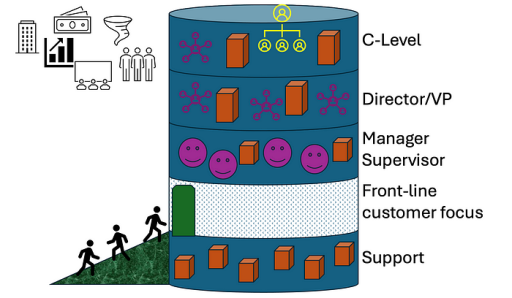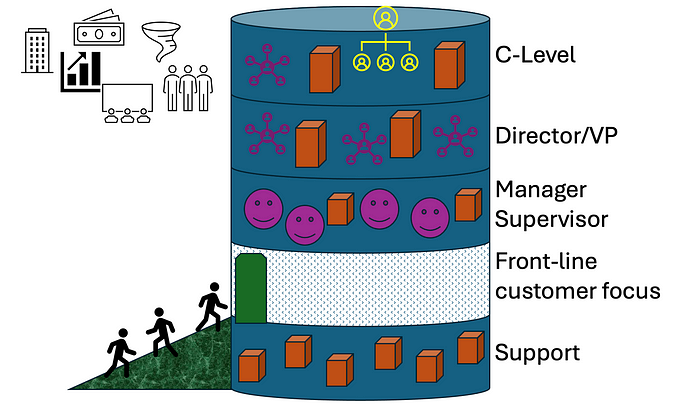Have you ever felt like there just aren’t enough hours in the day? Whether you’re answering phones in your first job or leading a company as CEO, feeling overwhelmed and time-strapped is a common experience. But what if I told you that effective time management strategies can be applied at every level of your career, helping you feel more productive and accomplished?
In this guide, I’ll share my insights and experiences, gained from my journey from answering phones in a customer service team to becoming a CEO. We’ll explore a simple yet powerful time management cadence that works across all roles, and then delve deeper into specific strategies for different levels of an organization, from the foundational support functions to the executive suite.
Throughout this journey, remember: you are not alone in your quest for better time management. By taking control of your schedule, utilizing the right tools, and prioritizing both work and well-being, you can conquer the clock and achieve your goals at any stage of your career.
The Power of a Consistent Rhythm: Your Time Management Cadence
Imagine yourself as an orchestra conductor. Each section of musicians – the strings, the brass, the percussion – needs to play their part at the right time, following a consistent rhythm. This harmony is what creates beautiful music.
Similarly, effective time management requires a cadence, a consistent rhythm of review, planning, and action. Regardless of your role or responsibilities, building this cadence is crucial for staying organized and focused.
Here’s a basic time management cadence that you can adapt to your specific situation:
- Daily:
- Clear your desk and mind. Tidy up your workspace and take a few minutes to jot down any lingering thoughts or tasks on a to-do list. This helps you start the next day fresh and focused.
- Weekly:
- Capture unfinished tasks and plan for the next week. Review your to-do list from the previous week, note any incomplete tasks, and add them to your new plan for the upcoming week. This ensures continuity and prevents important tasks from falling through the cracks.
- Monthly:
- Write a report of your accomplishments. Take some time to reflect on what you achieved in the past month. This could be a simple bullet-point list or a more detailed report, depending on your needs. Recognizing your progress can be a powerful motivator and help you stay focused on your goals.
- Quarterly:
- Celebrate your accomplishments and set goals for the next quarter. Take time to acknowledge your wins, big or small, from the past quarter. Then, set new goals for the upcoming three months, keeping your long-term vision in mind.
Building this cadence into your routine might feel challenging at first, but trust me, it’s worth the effort. The consistency will help you stay organized, avoid feeling overwhelmed, and make steady progress towards your goals.
Time Management Hacks for Different Levels: From the Ground Up
Now, let’s dive deeper and explore specific strategies tailored to different roles within an organization. Remember, the core time management principles remain the same, but the tactics might need to be adjusted to fit the unique demands of each level.
A. The Foundation: Support Functions (HR, IT, Marketing, etc.)
The unsung heroes of any organization, support functions keep the company running smoothly behind the scenes. From managing human resources to maintaining IT systems, these roles juggle diverse tasks and projects.
Key Challenges:
- Project Management: Support functions often manage projects through ticketing systems or internal tools. These projects can vary greatly in scope and complexity.
- Repeatability: While projects might seem different, many often have recurring elements. Identifying these patterns can help streamline processes.
- Visibility: The successes of support functions often go unnoticed. It’s crucial to find ways to showcase your progress and value.
Time Management Tips:
- Embrace project management tools: Utilize tools like Trello, Asana, ClickUp, or Monday.com to keep track of your tasks, identify recurring patterns, and collaborate with colleagues.
- Automate repetitive tasks: If certain aspects of your projects are repetitive, consider automating them using available tools or scripts. This will free up your time for more strategic work.
- Communicate progress and celebrate milestones: Don’t wait for someone to recognize your accomplishments. Regularly communicate your progress on projects and celebrate milestones to keep yourself motivated and demonstrate your value to the organization.
- Become a champion for improvement: Look for opportunities to improve processes within your area of expertise. Suggesting new tools, automation strategies, or workflow changes can significantly impact efficiency.
B. The Front Lines: Customer Focus (Customer Service, Sales, etc.)
The faces of the company, customer-focused roles directly interact with clients and play
a crucial role in building relationships and driving sales. However, these positions often come with unique time management challenges.
Key Challenges:
- Unpredictable Demands: Customer needs and requests are rarely predictable, making it difficult to manage time effectively.
- Reactive Work: Customer service representatives and salespeople often need to react to immediate customer needs, leaving less control over their schedules.
Time Management Tips:
- Master the CRM (Customer Relationship Management) tool: This is your best friend! Use it to log calls, track interactions, and manage customer data. This not only helps you remember details and personalize interactions but also allows you to demonstrate your productivity and identify areas for improvement.
- Declutter your workspace: A clean desk can lead to a clear mind. Take a few minutes at the end of the day to clear your workspace and organize your notes. This will help you start the next day fresh and focused.
- Leverage the power of the help desk: Don’t be afraid to utilize internal resources for complex issues or technical problems. This saves you time and ensures customers receive the best possible assistance.
- Develop a thick skin and prioritize self-care: Customer interactions can be demanding, so it’s crucial to develop resilience and prioritize your well-being. Take breaks throughout the day, practice relaxation techniques, and maintain a healthy work-life balance.
C. The Balancing Act: Managers and Supervisors
Moving into a management role often involves a shift in responsibilities. Managers not only contribute individually but also oversee the work of others, creating a new set of time management challenges.
Key Challenges:
- Balancing Individual and Team Responsibilities: Managers need to find a healthy balance between their own work and supporting their team members.
- Delegation and Oversight: Effective delegation is essential for managers, but it also requires careful oversight and guidance.
Time Management Tips:
- Become a calendar ninja: Master your calendar! Learn to schedule meetings, block time for focused work, and leverage features like time blocking to manage your day effectively.
- Learn to say no: Not all requests deserve your immediate attention. Learn to politely decline tasks that don’t align with your priorities or could be handled by others.
- Establish regular meetings: Schedule regular one-on-one meetings with your direct reports and hold weekly team meetings to discuss progress, address challenges, and foster collaboration.
- Develop a delegation system: Create a clear system for delegating tasks to your team members. This includes defining expectations, providing clear instructions, and offering ongoing support and feedback.
D. The Strategists: Directors and Vice Presidents
Directors and Vice Presidents play a vital role in shaping the company’s direction and managing various teams. Their time management challenges involve navigating complex situations and making strategic decisions.
Key Challenges:
- Limited Time and Competing Demands: Demands from various departments, stakeholders, and external factors can leave directors and VPs with limited time and competing priorities.
- Information Overload: Gathering and processing information from diverse sources is crucial for effective decision-making, but it can also be overwhelming.
Time Management Tips:
- Active listening is key: Practice active listening to gather information, understand different perspectives, and make informed decisions. Encourage open communication and feedback from your team members.
- Delegate effectively and leverage your calendar: Don’t try to do it all yourself. Delegate tasks effectively and leverage your calendar to manage your time and schedule strategically. Prioritize meetings that offer high value and contribute to achieving your goals.
- Build your network: Invest time in building and maintaining relationships with colleagues, industry experts, and potential collaborators. This network can be a valuable source of information and support.
- Embrace personal CRM: Consider using a personal CRM or contact log to manage your network effectively. This helps you keep track of contacts, their information, and the nature of your interactions, fostering stronger professional relationships.
E. The Leaders: C-Suite Executives
At the top of the organizational pyramid, C-Suite executives face unique time management challenges due to the sheer scope of their responsibilities and the demands of their positions.
Key Challenges:
- Travel and Meetings: Extensive travel and poorly run meetings can significantly disrupt schedules and make it difficult to focus on strategic work.
- Information Gaps: C-suite executives often face a lack of readily available internal data and may struggle to stay abreast of external trends and competitor activities.
Time Management Tips:
- Set a strategic focus and stick to it: Identify the key gaps between your vision and reality and dedicate 95% of your time to addressing them. Delegate other tasks and avoid getting bogged down in operational details.
- Control your calendar ruthlessly: Review your calendar regularly and ruthlessly prune meetings that don’t directly contribute to your strategic goals. Protect your time for focused thinking and strategic planning.
- Make time for your people: Schedule regular interactions with employees at various levels. This can involve one-on-one meetings, town halls, or informal chats. Connecting with your team members fosters trust, boosts morale, and helps you gather valuable insights.
- Prioritize self-care and schedule breaks: Don’t underestimate the importance of taking care of yourself. Schedule time for exercise, relaxation techniques, and hobbies you enjoy. A healthy and well-rested leader is a more effective leader.
Remember: Regardless of your position or the challenges you face, you are always in control of your time. By implementing these strategies, building a consistent time management cadence, and prioritizing your well-being, you can conquer the clock and achieve success at any level of your career.
Embrace the journey, experiment, and find what works best for you. Remember, time management is a continuous learning process. As you grow in your career and take on new challenges, be willing to adapt your strategies and embrace new tools to stay productive and achieve your goals.







